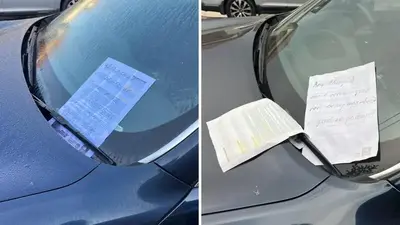Technology
Aussie man’s warning after scammers go on $1200 shopping spree with his credit card
A Sydney man is warning Australians over a ‘LinkT toll scam’ which led to him losing $1200, as his thieves went on a shopping spree.
Joel* said he had recently received a text message informing him that his toll account details were out of date.
“We’d recently bought a second-hand car and had transferred the number place across which has some lag for ordering an e-tag,” he told 7NEWS.com.au
Watch the latest news and stream for free on 7plus >>
“We’d set up an e-tag and were waiting for it to arrive and had received a few toll notices saying we didn’t have an e-tag to pay.
“At the same time, we received a text message saying our card details for our toll account needed updating. We clicked on the URL and put our card details in.”
However, just days later the unthinkable happened.
Joel says he noticed three transactions for $400 had turned up on his card from Coles in Campsie, in Sydney’s southwest.
“We reported it to the bank, and they said they’d investigate,” he said.
But after six months, the bank had determined Joel wouldn’t be getting his money back as he was the one who handed his details over.
“In hindsight it seems dumb, but it was a perfect storm of events that made it feel real,” Joel said.
In fact in 2022 alone, there were 14,585 reports made to Scamwatch of fake road toll messages, resulting in $660,000 in losses.
Stephen Kho, cybersecurity expert at Avast, warned that Australia was in the midst of a “scamdemic”.
“There is a clear disconnect between Australians’ perceived confidence in ability to identify a scam and the increasing amount of money being lost to scams every year,” he told 7NEWS.com.au.
“In reality, this is being further fuelled by our own fear of embarrassment, with half of Australians admitting they would feel embarrassed if they fell for a scam despite the prevalence and sophistication of some of these scams, as scammers get sharper with their tools and scams become increasingly more targeted to individuals’ situations.”
What to do
Kho has shared a list of tips to help Australians spot a scam.
He says if any of the following applies, it may mean you are being contacted by a scammer:
- The sender’s name is vague, and the email address is long or convoluted;
- The sender’s phone number is international or an unknown local phone number;
- The email or message is attention-grabbing or alarmist;
- The call you have received is from an unknown number with a robo-speaker;
- The email or message urges immediate action of some kind;
- The email, message or call cites some pretence for seeking your personal information, including asking you to log in or confirm your details on a website;
- The email or message requests payment or a transfer of funds; and
- The email or message urges you to click hyperlinked text or a link without clarifying where you are clicking.
Australians can report scams to the Australian Competition and Consumer Commission via the report a scam page to help spread the word.
*Not his real name.
-

 Technology13h ago
Technology13h agoAI harm is often behind the scenes and builds over time – a legal scholar explains how the law can adapt to respond
-

 Technology14h ago
Technology14h agoNewborn planet found orbiting young star, defying planet formation timeline | The Express Tribune
-

 Technology18h ago
Technology18h agoAwkwardness can hit in any social situation – here are a philosopher’s 5 strategies to navigate it with grace
-

 Technology18h ago
Technology18h agoNo need to overload your cranberry sauce with sugar this holiday season − a food scientist explains how to cook with fewer added sweeteners
-

 Technology1d ago
Technology1d agoTeslas are deadliest road vehicles despite safety features: study | The Express Tribune
-

 Technology1d ago
Technology1d agoThere Is a Solution to AI’s Existential Risk Problem
-

 Technology1d ago
Technology1d agoUS pushes to break up Google, calls for Chrome sell-off in major antitrust move | The Express Tribune
-

 Technology1d ago
Technology1d agoPublic health surveillance, from social media to sewage, spots disease outbreaks early to stop them fast



























